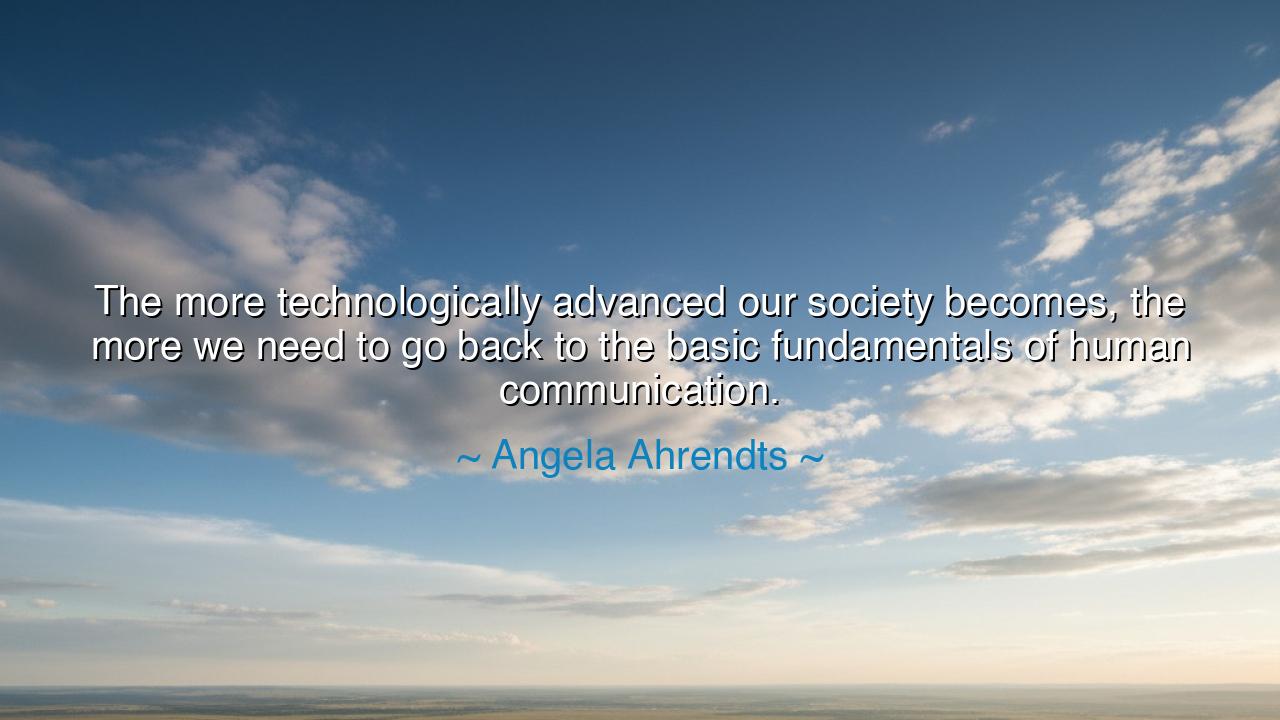
The more technologically advanced our society becomes, the more
The more technologically advanced our society becomes, the more we need to go back to the basic fundamentals of human communication.






Host: The room feels calm, with the soft glow of the lamp casting a warm light across the space. Outside, the world has settled into the quiet of the evening. Jeeny sits on the couch, her legs tucked beneath her, a cup of tea resting in her hands. Jack, standing near the window, gazes out at the darkened world outside, clearly lost in thought. The stillness of the moment invites a conversation about technology, human connection, and the balance between the two.
Jeeny: “Jack, I came across a quote from Angela Ahrendts today that really struck me,” she says softly. “She said, ‘The more technologically advanced our society becomes, the more we need to go back to the basic fundamentals of human communication.’ What do you think about that?”
Jack: He turns slowly, a thoughtful expression crossing his face. “That’s an interesting point. It’s almost as if Ahrendts is saying that while technology is improving at an incredible pace, it can sometimes make us forget the most important part of communication — the human connection. We’ve got all these tools at our disposal to communicate faster, more efficiently, but they can also create distance and make our conversations feel less personal. She seems to be suggesting that we need to reconnect with the core of communication — empathy, active listening, and real presence.”
Jeeny: “Exactly. It’s like we’ve become so absorbed in the tools of communication — texts, emails, social media — that we sometimes overlook the human element. Ahrendts is reminding us that no matter how advanced our technology becomes, the essence of good communication still lies in the ability to understand, connect, and be present with one another. Technology may help us connect more quickly, but it’s the fundamentals of human interaction that build trust and understanding.”
Host: The light in the room seems to deepen as the conversation touches on the balance between technology and meaningful human connection. Jeeny speaks with an understanding that, while technology has made communication more efficient, it’s also created a kind of detachment in how we interact with one another. Jack stands still, reflecting on how easy it is to become overwhelmed by digital tools and lose sight of the true purpose of communication.
Jack: “I think Ahrendts is talking about the quality of communication rather than the quantity. It’s not enough to just exchange information quickly; it’s about making sure we’re really listening, really engaging with the person on the other end. Technology can be a great tool, but it doesn’t replace the value of face-to-face conversation or the depth of understanding that comes from truly connecting with someone.”
Jeeny: “Yes! Technology can sometimes create an illusion of connection, where we think we’re communicating but we’re really just exchanging words. But real communication requires us to understand the emotion behind those words, to respond with empathy and authenticity. The more we advance in technology, the more we need to make a conscious effort to slow down and remember the importance of presence and meaningful interaction.”
Host: The conversation feels richer now, as they reflect on how human connection remains the core of effective communication, even in a world increasingly driven by technology. Jeeny and Jack both agree that technology can enhance communication, but it should never replace the deeper, more personal aspects of it. Angela Ahrendts’ words serve as a reminder that as we become more connected digitally, we must also make an effort to stay connected emotionally and humanly.
Jack: “It’s also interesting because in our increasingly digital world, we often forget the importance of non-verbal cues. The things we can’t convey through a screen — body language, tone of voice, facial expressions — are all part of real communication. No matter how much technology evolves, it’s the basic, human elements that truly connect us.”
Jeeny: “Exactly. And while digital communication is here to stay, we need to use it thoughtfully. Technology can enhance our ability to stay in touch, but it can also become a barrier if we rely on it too much and forget about the power of genuine conversation. Ahrendts is really calling for a balance — we can be technologically advanced, but we must never lose sight of the human side of communication.”
Host: The room feels quieter now, as if the weight of their conversation has settled into something deeper. Jeeny and Jack sit together, reflecting on the role of technology in communication, and how, as we continue to advance, we must remember to ground ourselves in the basic, human fundamentals that create true connection. Angela Ahrendts’ words remind them that in a world full of digital tools, it’s still empathy, understanding, and presence that make communication meaningful. The balance between technology and human connection is key to building relationships that are not just fast, but deep and authentic.






AAdministratorAdministrator
Welcome, honored guests. Please leave a comment, we will respond soon